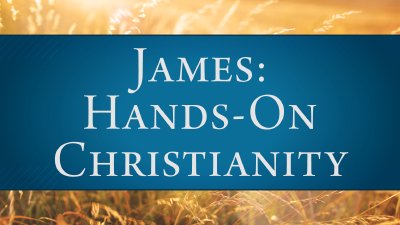


James: Hands-On Christianity
16 Sermons on James
A Case for Practical Christianity
Pastor Chuck Swindoll • James 1:1–12
Although Martin Luther saw James as merely an epistle of straw, it stands to this day as one of the most practical and penetrating books in all the Bible. Don't be fooled by its size! It may be brief, but it's strong. It refuses to let the reader hide behind a mask of theory or within the wall of an intellectual faith. True faith produces authenticity. “No authenticity . . . no faith” is James' analysis of the matter. It may make us squirm, but it gets us off the fence.
When Troubles Won't Go Away
Pastor Chuck Swindoll • James 1:1–12
Much of life's music is played in a minor key. Hurts, heartaches, pain, problems, disappointments, discouragements, sickness, suffering, disease, and death pile upon us—and won't go away. This creates within us questions regarding God's justice and life's purpose. Philosophers have attempted to interpret this heavy scene but have failed to bring any measure of relief to man's misery. Entertainment may temporarily dull the edge but offers no permanent answers. Education, travel, occupation, and even overt acts of kindness provide little help when we are overwhelmed by troubles. Let's face this issue directly and find comfort as well as answers regarding the knotty problem of persistent, unending troubles.
Plain Talk about Temptation
Pastor Chuck Swindoll • James 1:13–18
In his profound work, "Temptation," Dietrich Bonhoeffer vividly portrays with his pen the battleground of our experience. We can all identify with this scene: "In our members there is a slumbering inclination towards desire which is both sudden and fierce. With irresistible power, desire seizes mastery over the flesh. All at once a secret, smouldering fire is kindled. The flesh burns and is in flames. It makes no difference whether it is sexual desire or ambition or vanity or desire for revenge or love of fame and power or greed for money . . . At this moment God is quite unreal to us. He loses all reality, and only desire for the creature is real . . . The powers of clear discrimination and of decision are taken from us." In this message, we face the problem Bonhoeffer describes and, hopefully, we'll discover some workable techniques that will enable us to walk in victory in spite of the enticements to yield.
The Great Divorce
Pastor Chuck Swindoll • James 1:19–27
Solomon began the sixth chapter of Ecclesiastes with penetrating words: "There is an evil which I have seen under the sun And it is prevalent among men." The message God has for us could be introduced with those very words. It has to do with a common and prevalent ailment that exists in the body of Christ . . . a “disease” that has crippling effects upon our effectiveness and production. The evil illness neutralizes our impact and nullifies our testimony. It is the problem of divorce—not between husband and wife but between theory and practice, between hearing and doing. James dealt with trials (James 1:1-12) and temptations (1:13-18), but in 1:19-27 comes the basic theme of the letter—the importance of behaving like we believe. The absence of such constitutes “the great divorce” among the ranks of Christianity.
Prejudice Is a Sin
Pastor Chuck Swindoll • James 2:1–13
Like the proverbial man from Missouri, James continued to say, “Prove it to me! If you believe like you should, why do you behave like you shouldn't?” Throughout the entire first chapter, James punctured the bubble of theoretical faith with the sharp needle of realistic examples. He declared, in effect, that real faith, when stretched by tests of temptations, doesn't break—it is stable. This is true when we are not merely “hearers” but effective “doers” of the truth we claim to believe. In chapter 2, James dug even deeper. His initial desire was to show that real faith, when faced with different types of people, won't misjudge or succumb to partiality or prejudice. Why? Because real faith operates on the basis of genuine love.
You Can't Have One without the Other
Pastor Chuck Swindoll • James 2:14–26
The blazing brand of the Reformation was “justification by faith!” Martin Luther was the passionate blacksmith who forged it out with his hammer of conviction on the anvil of Romans. Since his day, evangelical Christians have borne that mark and stood upon the principle that salvation is a faith-plus-nothing transaction. Especially helpful in heating the fire under this historical “brand” are such passages as Ephesians 2:8-9; 2 Timothy 1:9; and Titus 3:5. But this passage under consideration in the letter of James seems to suggest a contradiction. We want to discover exactly what it says, how it fits into the theme of justification by faith . . . and then why it is important to us today. In reality, this section in chapter 2 is the major message of the whole letter—in miniature form.
Bridling the Beast in Your Body
Pastor Chuck Swindoll • James 3:1–12
In James 2:14-26, James presented his main message—genuine faith in the Lord Jesus Christ produces works that reveal we are children of God. In this third chapter, James went for the jugular of the Christian life, the tongue! In these twelve verses, we are given a basic principle, then illustrations and examples that amplify the principle. No other section of the Bible speaks with greater authority and impact about the tongue than this which James wrote. Ask God to rivet His truth into your life as you are exposed to this powerful passage of Scripture. Then, with your heart filled with truth, your tongue will honor Him.
The Wise, the Unwise, and the Otherwise (Part One)
Pastor Chuck Swindoll • James 3:13–18
In our study of James 3:1-12, we considered the Christian and his tongue. We saw that the teacher is especially vulnerable, since the tongue is the tool he or she most commonly employs. But there is another vehicle of communication equally significant—the life. That is the subject of verses 13-18 (note “behavior” in verse 13). To deal adequately with this subject, James placed in sharp contrast those who are wise and those who are unwise. He developed both by showing the tests, characteristics, and results of each so we can determine which is in operation.
The Wise, the Unwise, and the Otherwise (Part Two)
Pastor Chuck Swindoll • James 3:14–18
It is virtually impossible to separate truth from the one who teaches it to us. This fact alone assures us that the one who teaches ought to be exceedingly cautious with what one says and how one lives. That's why James began the third chapter with a warning—don't swell the ranks of teachers! The teacher lives with two things constantly under scrutiny—his or her lips and life. In James 3:1-12, he addressed himself to the former area —the tongue—and in 3:13-18, to the latter, which he developed under the subject of wisdom. The last message considered the kind of wisdom that is not from God. In this message we'll give thought to the wisdom that is from Him. This passage is applicable to all who are in God's family, not just those who teach.
How Fights Are Started and Stopped
Pastor Chuck Swindoll • James 4:1–10
The chapter break between James 3:18 and 4:1 is an unfortunate one, for James neither changed the subject nor shifted his emphasis. In fact, the initial comments he made regarding the destructive nature of the tongue (3:6-10) build to a great crescendo in the beginning of this fourth chapter as he dealt with open conflicts among Christians. In 4:1-10, there is set forth the reasons for fights among believers as well as their tragic results. But James didn't leave us without some answers on how to stop those conflicts that have taken their toll within our ranks.
The Peril of Playing God
Pastor Chuck Swindoll • James 4:11–17
In coming to an end of the fourth chapter, James dealt directly with a common problem among Christians—“playing God.” Having just exposed our tendency to be self-assertive and quarrelsome (4:1-10), he went a step further and showed a couple of the more familiar ways we assert an arrogant spirit. The first has to do with the way we often view others . . . and the second has to do with the way we often view ourselves. In the first section (4:11-12) James dealt with our tendency to take the place of God in others' lives as we judge or criticize them. In the second section (4:13-16), he dealt with our tendency to take the place of God in our own lives as we presume or boast in ourselves.
Warnings to the Wealthy
Pastor Chuck Swindoll • James 5:1–6
It is reported that F. Scott Fitzgerald and Ernest Hemingway once engaged in the following interchange: Fitzgerald: “You know, Ernest, the rich are different from us.” Hemingway: “Yes, I know. They have more money than we do.” It is debatable that this conversation actually occurred, but the humor based on the obvious fact brings a smile to our lips. The more notable significance in the interchange is the part that is left unanswered, namely, how are the rich different—or are they? Secrecy shrouds the inner life of the wealthy. Gossip, legend, and imagination surround the subject, so it's next to impossible to uncover the truth. The rich are notoriously private people. In this message, we shall hear what God says about and to a certain percentage of the wealthy—at least, the wealthy of the first century. Then we'll consider how it relates to the wealthy of today. The basis of our thoughts is found in James 5:1-6.
Doing Right When You've Been Done Wrong
Pastor Chuck Swindoll • James 5:7–12
We have all experienced the hurt of mistreatment and misunderstanding. Such hurts come in a variety of packages: an intolerable working situation, domestic conflicts, a parent, child, or relative who takes advantage of us, a friend who turns against us, a neighbor who entertains untrue opinions of us, and dozens of other painful circumstances. Our natural tendency is to retaliate by returning evil for evil—to “get back”—to hold a grudge and become bitter in our souls. God has a better idea! James revealed this alternative in the passage we're considering within this message. James not only told us what to do in place of retaliation; he told us how to do it.
Suffering, Sickness, Sin—and Healing
Pastor Chuck Swindoll • James 5:13–16
One of the most controversial issues of our day has to do with divine healing and healers. People travel halfway around the world to get in touch with those who claim to have the gift of healing. Testimonies abound of people who claim that they have been healed. Are these things for real? What about the use of medicine? Should everyone believe God for healing? What is the method God honors? A better question than all these put together is this: What is the biblical teaching regarding healing? Let's consult James 5:13-16 as we seek answers to that question.
The Power of Effective Kneeling
Pastor Chuck Swindoll • James 5:13–18
Effective, fervent, bold prayer takes heaven by storm. Such communication with the Almighty is the slender nerve that moves the muscles of omnipotence. How well John Welsh knew that! Eight of his twenty-four hours every day were so invested. David Brainerd, George Mueller, Hudson Taylor, Rees Howells, and C. T. Studd were cut from the same piece of cloth. It was said that John Wesley's prayers changed the face of England far more than his preaching. “The saint who advances on his knees,” wrote Jim Elliot, “never retreats!” Our thoughts center upon this crucial matter of kneeling with power as we consider the counsel of one whose life gave significance to his words—James.


